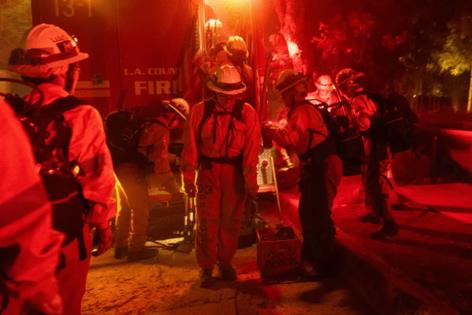Commentary: California's inmate firefighters deserve more than a raise. Make them employees
Published in Op Eds
Kim Kardashian posted a plea to Gov. Gavin Newsom on Instagram last week saying wages for inmates fighting the Los Angeles County wildfires should be raised. Right now, they’re paid between $5.80 and $10.24 per day, depending on their skill level, with an additional $1 per hour during emergencies. Other celebrities called for a “parade” in honor of these incarcerated heroes — and for more leniency on their prison sentences.
The Conservation Camp program, as the California Department of Corrections and Rehabilitation calls it, is an exemplar of prison labor. It allows participants to live outside the prison and earn time off their sentences. After they’ve completed their terms, they are immediately eligible to have their records expunged which is necessary to get around California’s licensing requirements to work as a firefighter. Newsom signed a bill in 2020 to assure this.
The department currently runs 35 conservation camps in 25 counties. In 2021, approximately 3,700 prisoners worked in the conservation camps; around 2,600 were trained. In May of last year, 1,867 people were training. While different numbers have been bandied about, more than 900 inmate firefighters are currently helping to put out fires in Los Angeles. The county could have used more.
These firefighters deserve something even better than raised wages or celebrations. They should be designated what they are: employees.
Wildland and urban fires are on the rise in California. Under the incoming Trump administration, the state’s fiscal future is unclear. And the Los Angeles County Fire Department is understaffed (though notably, the California Department of Forestry and Fire Protection, the organization that co-oversees the prisoner firefighter camps with the Department of Corrections and Rehabilitation, and where many camp graduates land jobs, was adequately staffed as of 2023). It makes sense to maintain the conservation camps and not do anything to endanger them, which raising the wage could potentially do. When the Legislature took up a bill to ban involuntary servitude in 2022, the cumulative cost of an increased wage caused lawmakers to withdraw support.
Other considerations belong in the discussion of helping inmate firefighters, including that they are four times more likely to incur injuries from debris or other objects and eight times more likely to be hurt after inhaling smoke and particulates compared with professional firefighters. Yet unlike their professional counterparts, they don’t receive protections or benefits.
Between 2017 and 2020, according to the Legislature, at least three inmates died fighting fires. Another, Shawna Jones, was killed by a falling boulder while fighting a Malibu fire in 2016. Her family was billed$100,000 by the hospital, although it credited her account for a portion of that amount for her organ donations, according to the book “Breathing Fire: Female Firefighters on the Front Line.”
If Jones hadn’t been incarcerated, her medical costs might have been paid by the Public Safety Officers Benefit Act. But 30 years ago, a federal court of appeals held that inmate firefighters in Arizona were not acting in an official capacity when battling blazes. It was not a logical conclusion but a legal one; other laws specifically carved out prisoners from the definition of employees. Neither the IRS nor the Occupational Safety and Health Administration designate incarcerated people as employees. The Toxic Substances Act and the Clean Air Act also don’t apply to inmates. Courts are split on whether the Fair Labor Standards Act applies to people working while they’re confined.
Of course, declaring that working inmates are employees would likely trigger the application of minimum wage statutes, putting the program at the same risk as in 2022, during the debates around the bill about involuntary servitude. But defining someone as an employee for a limited purpose is familiar territory, and California could write the statute so that it doesn’t risk the program. Some states classify volunteer firefighters as employees to give them certain legal protections without having to pay them wages. In California and New York, for example, these volunteers are employees so they can file workers’ compensation claims.
Of course prisoner firefighters deserve better wages (and, sure, a parade). But they deserve freedom and dignity more, which includes recognizing that their work is as valuable as that of any other responder in this crisis.
____
Chandra Bozelko is a journalist who covers criminal justice issues.
©2025 Los Angeles Times. Visit at latimes.com. Distributed by Tribune Content Agency, LLC.




























































Comments